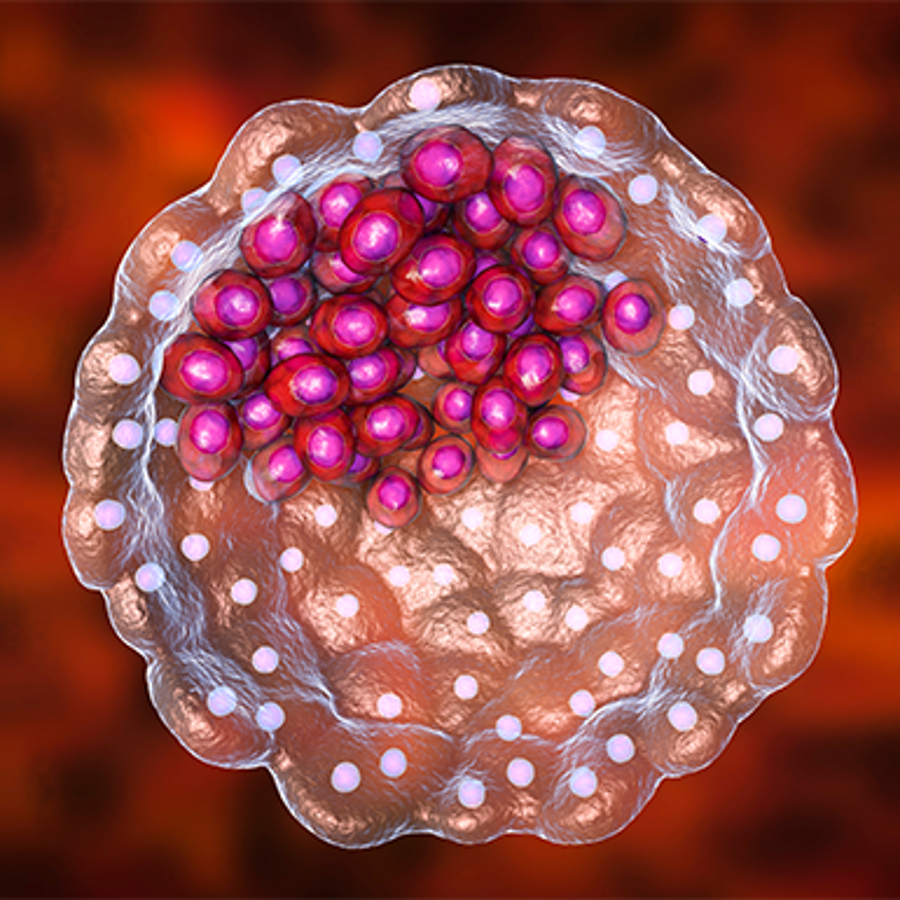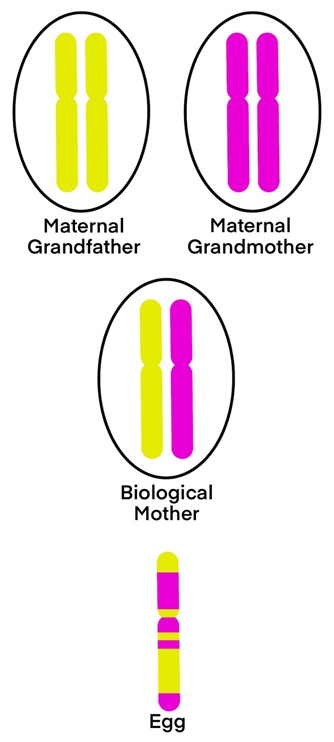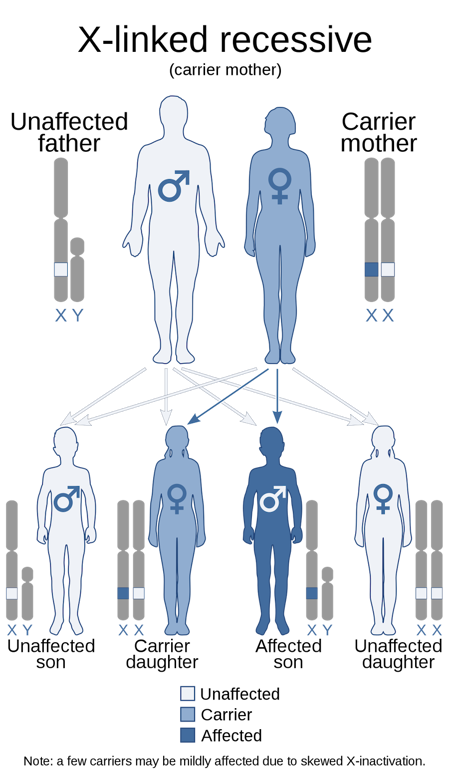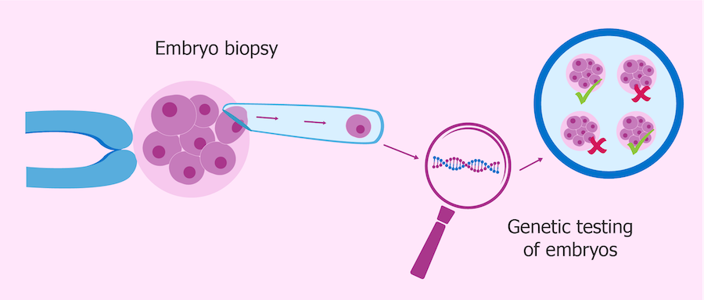
How does selecting against a disease affect the traits my son will inherit from his grandmother?
July 28, 2011

- Related Topics:
- Chromosomes,
- Medical genetics,
- Genetic conditions,
- Recombination
A curious adult from Louisiana asks:
"I carry an unknown mutation that causes a urea cycle disorder, OTC deficiency. So in short, my husband and I are in the process of doing PGD to block the X that I inherited from my mother from being passed along to my son. My question is, does that mean that since my mother’s X will never be passed along to our future sons, that every characteristic I got from my mother will never be passed along to them either? Ex. I have my mom’s nose etc."
Good news, part of your mother's X-chromosome without the OTC deficiency can still be passed on to your children. Not only part of your mother's X, but also parts of her other chromosomes too!
We have lots of chromosomes — 46 to be exact. Traits such as hair color, nose shape, etc., are found all over our chromosomes. So not passing one along does not mean that the child wouldn't get any traits from that grandparent.
It really isn't that different from a dad having a son. The paternal grandmother gave her son an X but he will only pass a Y to his sons. And yet these sons can have lots of that grandma's traits.
Part of the reason for this is what we already talked about — there are many chromosomes. But another reason is that sometimes traits such as a nose shape can be found in more than one chromosome. Which means most of your grandmother's nose shape might be passed down even if one of her chromosomes wasn't.
Here are a few examples of traits, and which chromosome they are found on:
|
Trait |
Chromosome |
|
Blue/Green Eye color |
15 |
|
Red hair |
16 |
|
Lactose intolerance |
2 |
|
Resistance to HIV |
3 |
|
Color blindness |
X |
Taken together, this all means that even if none of your kids got her X, your kids would still have lots of her traits.
But because of something called recombination, your kids will definitely get some of her X chromosome too. So the only part of the X they wouldn't get is the bit around the spot that can lead to OTC deficiency.
And because there are undoubtedly only a few traits there, this means that your sons wouldn't lose too many of her traits. Certainly, no more than we would expect from any pregnancy.
Recombination
Recombination means shuffling between chromosomes. It is a process that happens to our germ cells (egg or sperm).
Chromosomes are long stretches of DNA that together have the instructions for making and running a living thing. Most humans have 46 of them.
We get 23 chromosomes from each of our parents. This is why we actually have 23 pairs of chromosomes. We have two copies of chromosome 1, two copies of chromosome 2, and so on up to chromosome 22.
The way this works is that sperm and egg cells have 23 chromosomes each. An egg with 23 combines with a sperm with 23 to get the final 46.
From this, you might conclude that the egg cell has some chromosomes from your mom and some from your dad (i.e. chromosome 1 from mom, chromosome 2 from dad, etc). And you'd be right, but probably not in the way you think.
Like I said, eggs and sperm have 23 chromosomes. But these 23 chromosomes are not just from our mom's or from our dad's chromosomes. They are actually a mix of the two because of recombination.
Recombination happens between pairs of the same chromosomes. Chromosome 1 from our mom recombines with chromosome 1 from our dad. This gives a unique, never before seen chromosome 1 that is a mix of your mom's and your dad's chromosome 1.
This then continues with the other chromosomes up to number 22. So chromosomes 1-22 have a combination of your mom and your dad's DNA. And those mixed chromosomes are what you would pass down to your child.

Now you may have noticed that there is still one set of chromosomes left. These are called the sex chromosomes and they differ between males and females.
Because females have two X-chromosomes, their X's recombine. Males have one X-chromosome and one Y-chromosome, so not a lot of recombination happens between these two.
What this means is that your two X's will recombine to new, mixed X's. And all your egg cells will have some bits of your mom's X-chromosome.
Let's look further at recombination between two X-chromosomes and what may happen if there is only one X chromosome (as is true in males). We'll focus on the part of the X chromosome that can lead to OTC deficiency — the OTC gene.
Sex Chromosomes and Sex Linked-Traits
As I said before, our chromosomes contain the instructions for making and running us. These instructions come in the form of genes. Each gene has the instructions for one small part of us.
So there is a gene for making muscle fibers. And one for making hemoglobin in our red blood cells. And another one for turning toxic byproducts into harmless urea.
This last one is the OTC gene. And when it doesn't work properly, you can end up with OTC deficiency. In some cases, this can lead to early death because of buildup of toxic byproducts in the body.
Because the OTC gene sits on the X-chromosome, it is an example of an X-linked gene.
You inherited an X from your dad that has a working OTC gene and an X from your mom with an OTC gene that doesn't work well. This is why you do not have OTC deficiency but can pass it on to your kids. You carry the version of the gene that can cause the disease, but your dad gave you a healthy version of the gene that can compensate.
When you make eggs, your two X-chromosomes line up next to each other and swap DNA. So, one X-chromosome can have the non-working copy of the gene from your mom mixed with your dad's DNA. The other can have the working copy of the gene from your dad mixed with the other genes from your mom.
If you were to have a son, then he would have a 50% chance of getting the non-working of the OTC gene. If he gets this OTC gene, he would probably end up with OTC deficiency because unlike you, he does not have a second working OTC gene. Daughters would have a 50% chance of inheriting the non-working OTC gene too. But odds are they would get a working copy from their dad and so not end up with full blown OTC deficiency.

Many traits like OTC deficiency, red-green color-blindness, hemophilia, and some forms of muscular dystrophy are more common in males because males usually only have one X chromosome. To end up with these conditions, you need for all the copies of the causative gene to be the bad version.
And this is what you are trying to avoid here. You want to ensure that your future sons get an X with a working copy of the OTC gene. And one way that some parents do this is by using PGD to either select for female embryos (who will have an X from mom and dad that does not have the OTC deficiency) or select male embryos that do not carry the mutation.
Embryo Screening (PGD)
Preimplantation genetic diagnosis (PGD) is really just screening embryos for specific DNA. It is used with assisted reproductive technology and requires in vitro fertilization.
During this process, an egg is fertilized by a sperm in vitro (outside the body) and the embryo is allowed to grow to a specific stage called a blastocyst. At this stage, the embryo has enough cells that some can be tested for specific DNA mutations.

If there is a mutation, such as in the OTC gene, the parents may choose not to have that embryo implanted. Thereby, the parents select for embryos that do not have a specific mutation.
Your case is a little different though. Yours is an unknown mutation, presumably in the OTC gene. As we discussed earlier, there is no way to simply block mom's X because of recombination. Therefore, scientists must somehow identify the region around your mother's OTC gene that is different from your father's OTC gene. The idea would be to select only those embryos with dad's OTC gene.
But again, no worries about your mom's traits. Because of the other 44 chromosomes and recombination, your future kids will definitely inherit some of her traits. Even if you use PGD to avoid passing down your OTC gene variant.

Author: Cecil Benitez
When this answer was published in 2011, Cecil was a Ph.D. candidate in the Department of Developmental Biology, studying endocrine development of the pancreas in Seung Kim's laboratory. Cecil wrote this answer while participating in the Stanford at The Tech program.
 Skip Navigation
Skip Navigation
